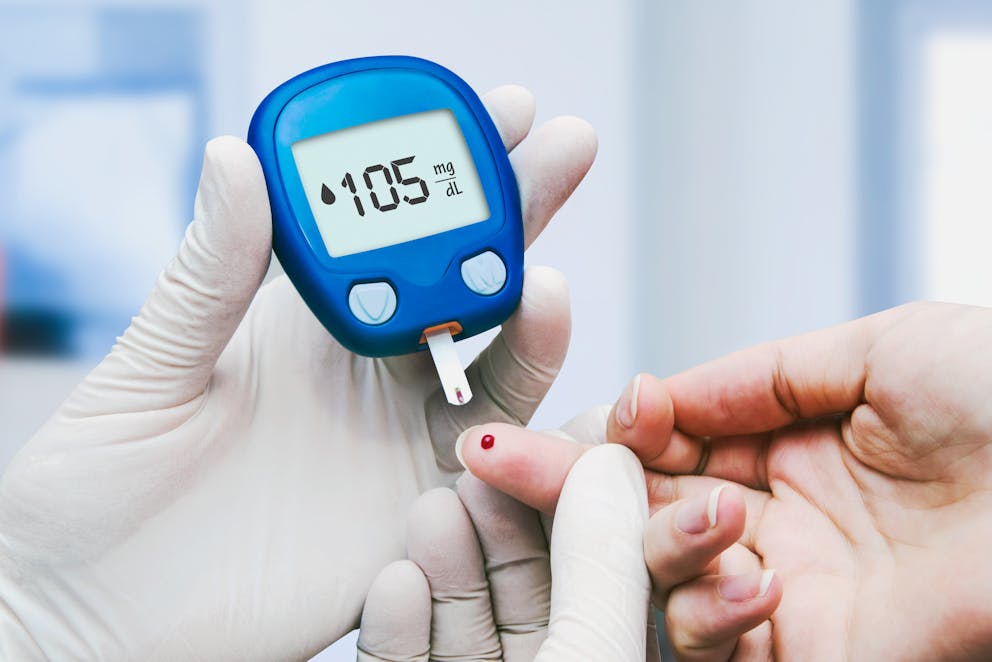Intermittent Fasting Could Replace Insulin for Diabetes
Intermittent fasting is not often looked at as a method of managing blood sugar levels, yet it holds significant potential.
Learn about the potential for intermittent fasting to help with diabetes management, as well as insulin resistance.
Understanding Diabetes and the Role of Insulin
Diabetes, a chronic health condition characterized by high blood sugar levels, has two main types: type 1 and type 2. Both have distinct characteristics that impact how your body uses insulin to convert food into energy.
Type 1 diabetes is an autoimmune disease where the body's immune system mistakenly attacks and destroys insulin-producing cells in the pancreas, typically diagnosed in childhood or adolescence.
In contrast with this, Type 2 diabetes, often associated with lifestyle factors such as obesity and lack of physical activity, usually surfaces later in life.
The Complications Associated With High Levels Of Insulin And Sugar
High levels of blood sugar can cause severe issues such as heart disease, stroke, and kidney failure. Similarly, raised insulin levels harm health, including weight gain and increased risk for cardiovascular diseases.
Beyond these common issues, each condition carries its unique side effects.
High insulin levels are associated with complications, including low potassium levels, which cause muscle weakness, fatigue, etc. At the same time, high-sugar-level-related issues make you more susceptible to infections, delay the wound healing process, etc.
Thus, maintaining an optimal balance between these two becomes crucial to managing this ailment effectively.

The Power of Intermittent Fasting
Alternating between eating and not consuming food, intermittent fasting is a dietary approach. It offers numerous benefits, including weight loss assistance and improved insulin sensitivity.
A significant advantage of intermittent fasting lies in its potential to reverse insulin resistance, a primary concern for individuals with type 2 diabetes.
As intermittent fasting decreases the body's demand for insulin, it can improve blood sugar control and overall health outcomes.
Case Study - Fasting vs Insulin Dependence
An intriguing case study sheds light on the efficacy of intermittent fasting against reliance on externally supplied (exogenous) insulin due to advanced stages of type 2 diabetes.
The study involves three patients who embarked on an intensive therapeutic fast under expert supervision over several months.
Incredibly, all participants discontinued using exogenous insulin within days or weeks after initiating the regimen, achieving substantial weight loss and improved metabolic markers.
This BMJ Case Reports published research demonstrates strong evidence supporting this method's effectiveness; however, intense programs like these may not be suitable for everyone without proper guidance, given safety issues surrounding drastic diet changes.
Finding Your Suitable Plan
Diverse types are available when implementing an intermittent fasting plan. Some involve skipping meals on certain days, while others restrict daily feeding windows, such as squeezing all meals into six hours, leaving rest hours reserved for a fasted state.
Each has advantages depending upon individual needs, so finding one fitting best would be the ideal way forward toward a healthier life.
If exploring further, consult healthcare professionals before embarking on any new regime, especially if underlying conditions exist like diabetes.
How Reducing Carbohydrate Intake Can Help
In the context of diabetes management, carbohydrates play a significant role. Overconsumption can lead to elevated blood sugar levels and worsen both type 1 and type 2 diabetes conditions.
By reducing carbohydrate intake through methods such as intermittent fasting or adopting a ketogenic diet, one can significantly decrease their insulin needs. Fewer carbs mean less glucose for your body's insulin to manage.
Implementing a Ketogenic Diet
Replacing glucose-based energy with ketone-based energy from fats is the primary goal of a high-fat, low-carb ketogenic diet. The state this creates, known as ketosis, reduces reliance on insulin production while improving its sensitivity over time.
Successfully implementing this dietary change requires thoughtful planning and monitoring. Prioritize healthy fats like avocados, nuts, and seeds while avoiding trans fats commonly found in processed foods to maintain ketosis and regulate blood sugar levels.
Select lean proteins such as chicken breast or fish rather than fattier cuts, which could kick you out of ketosis if consumed excessively due to the gluconeogenesis process that converts excess protein into glucose, raising blood sugars again.
Fruits should primarily consist of low-glycemic options like berries, as they have a lesser impact on blood sugars compared to their high-glycemic counterparts like bananas, grapes, pineapples, etc. For vegetables, leafy greens, broccoli, cauliflower, and bell peppers are all excellent choices as they're rich in nutrients and fiber yet relatively lower in carbohydrates.
This approach may seem daunting initially; however, once adopted, many people find it sustainable and enjoyable, leading to significant weight loss and improved overall health, including better control over diabetes symptoms. Remember, though, that every individual is unique, and what works for one person may not necessarily work for another. Therefore, it is always advisable to seek medical advice before making drastic alterations in dietary habits, particularly when managing chronic illnesses like diabetes.
Collaborating With Your Healthcare Provider on Lifestyle Changes
Introducing shifts to your lifestyle, like periods of fasting or the keto diet, can have a significant effect on your well-being and diabetes control. It's crucial to consult with a healthcare professional before initiating these modifications.
Your doctor is equipped with knowledge about how these alterations might affect you specifically. They can also monitor progress and make necessary adjustments in medications if required.
Navigating Communication With Your Medical Team
Maintaining open communication lines between you and your medical team is integral to managing diabetes effectively. Discussing all aspects of your well-being, including dietary habits and physical activity levels, should be part of regular consultations.
Prior preparation for discussions around implementing intermittent fasting plans, like jotting down queries or concerns beforehand, ensures that no critical point gets missed during conversations.
If possible, share data from tracking devices that record blood sugar levels, giving them a comprehensive understanding of recent control over the condition and aiding their advice regarding potential safety issues surrounding fasting, especially for diabetics.
Tailoring Adjustments Based On Professional Advice
Bear in mind that while research indicates most people could benefit from intermittent fasting plans, they aren't necessarily suitable across the board, particularly for those with certain hormone-related conditions or inadequate protein intake due to specific diets.
Therefore, the importance cannot be overstated enough. When considering significant changes, always heed professional advice and avoid unnecessary risks associated with potentially intense programs.
Turning to more feasible options, such as time-restricted eating, which involves squeezing meals within specified hours each day, can significantly improve insulin sensitivity without causing extreme stress on the body that longer fasts might do.
The key takeaway here is that safety comes first. Therefore, an individualized approach based on personal circumstances, guided by professionals, remains the optimal strategy.
The Future of Diabetes Treatment - A Shift From Medication?
Recent advancements in health and nutrition are leading to a compelling dialogue about the potential shift from medication-based diabetes treatment toward lifestyle modifications.
The focus is not on eliminating medications but on redefining their role as part of an integrated approach.
Potential Barriers and Challenges
A significant barrier that might hamper this transition is rooted in conventional beliefs surrounding type 2 diabetes treatments, where managing blood sugar levels with insulin or other glucose-lowering drugs has been standard practice for years.
An additional challenge pertains to safety issues surrounding fasting and dietary changes. Intense fasting programs turn beneficial practices into potentially harmful extremes if not appropriately managed.
Therefore, any change in diet or introduction of intermittent fasting plans mustn't necessarily be undertaken without expert oversight, which seems essential.
Besides these barriers, patients may face personal hurdles such as maintaining motivation during significant lifestyle changes or inadequate protein intake while following strict diet plans like the CMNT diet, which focuses on critical nutritional requirements, including proteins.
Navigating Through These Challenges
Navigating these challenges effectively requires guidance from healthcare professionals who can provide safe methods for implementing new dietary habits and closely monitor patient progress.
Moreover, effective communication between patients and healthcare providers regarding health goals also plays a pivotal role here.
Tools offering strategies for discussing health objectives openly with your doctor so you're both working towards the same goal - improved insulin sensitivity leading to better management of blood sugar levels through weight loss achieved by fasting intermittently under professional supervision.
Practical Strategies for Living Well With Diabetes
Effectively managing diabetes involves a holistic approach that includes lifestyle modifications, regular physical activity, and strategic medication management. Here are some practical tips to help individuals with diabetes improve their health outcomes.
The Impact of Regular Exercise
Regular physical activity plays an integral role in blood sugar control and improving insulin sensitivity - critical factors for those looking at how intermittent fasting's low blood sugar effects might aid weight loss and potentially reverse type 2 diabetes symptoms effectively.
Combining aerobic exercises like walking or cycling alongside resistance training like weightlifting often yields optimal results.
Remember, before starting any new exercise regimen, consult your doctor first to ensure safety issues surrounding fasting coupled with intense workouts are considered, particularly if under specific medications.
Dietary Modifications: More Than Just Reducing Carbs
A common misconception about managing diabetes revolves around eliminating carbohydrates from one's diet, but adequate protein intake remains just as critical while meeting essential nutritional requirements.
Adopting plans where fasting intermittently isn't necessarily about skipping meals.
Instead, these time-restricted eating patterns involve squeezing meal times within certain hours each day, which research suggests may lead to not only significant weight loss but also increased insulin sensitivity, thus helping manage type 1 and type 2 diabetics more efficiently without relying solely on heavy medication doses.

24-Hour Fasting and Blood Sugar Control
Considering the impact of 24-hour fasting on blood sugar control? Engaging in a 24-hour fast can potentially positively affect blood sugar levels.
This fasting approach, where individuals abstain from food for a day, may help regulate blood sugar by allowing the body to utilize stored glucose and improve insulin sensitivity.
The temporary restriction of food intake during the 24 hours can support the body in maintaining stable blood sugar levels, potentially benefiting individuals with insulin resistance or diabetes.
However, as with any dietary change, it's essential to consult a healthcare professional before embarking on a 24-hour fasting routine, particularly if you have underlying health conditions.
Conclusion
Intermittent fasting emerges as a promising approach to managing blood sugar levels and improving overall health outcomes for individuals with diabetes.
By understanding the role of insulin, the complexities of diabetes types, and the potential benefits of intermittent fasting, individuals can make informed decisions about incorporating fasting into their diabetes management plan.
With careful consideration of individual needs, professional guidance, and a holistic approach to lifestyle modifications, intermittent fasting holds significant potential as a complementary strategy in the management of diabetes and insulin resistance.
Previous blog
7 Things that Can Pull You Out of Depression
Popular
08/21/2024
55K views
02/23/2025
46.3K views
11/18/2024
277.7K views
03/18/2024
11/21/2022




